- From Faith Current: “The Sacred Ordinary: St. Peter’s Church Hall” - May 1, 2023
- A brief (?) hiatus - April 22, 2023
- Something Happened - March 6, 2023
Taking a moment on this lazy Sunday to pass along a mildly interesting recording I found last night: the infamous 1967 Brian Epstein interview with WOR-FM’s Murray Kaufman (“Murray the K”) from March 1967. Brian was in the US announcing the addition of Robert Stigwood (and Stigwood’s acts The Cream and The Who) to his company NEMS.
The coolest bit comes at the 15:00 mark, where Brian mentions turning “Sgt. Pepper” into a TV show. Is this what became “Magical Mystery Tour”? Could be — according to this page, MMT began in April, shortly after this interview. Of course we know it accelerated in September after Brian’s death, with Paul McCartney taking the lead.
The rest of the chat is about what you’d expect, but it’s gained a bit of prominence because of Brian’s obviously drugged condition during the beginning. According to great & good friend Nat Weiss (and I’m not using that in the old TIME magazine sense, although who knows?) the moments before the interview were a lot more dramatic than the talk itself:
“Before he was to give a radio interview with Murray the K, I came into the room (in the Waldorf Towers) to find Brian slurring his language. Obviously he had taken several Nembutals. He had this interview coming up and there were people in the waiting room waiting to see him, and he was like this. I found the bottle. I had to wrestle with him on the floor, throw the bottle out of the window of the hotel and just yell at him. Eventually, with coffee and things like that, we got him together and we took him to the interview.”
Maybe because I was expecting it to be a lot worse, what struck me was how lucid Brian seemed by the end — he’s not the out-of-control mess that is suggested in, for example, this portion of “The Brian Epstein Story.” (Begins at 8:03.)
The Steve Jobs of Rock and Roll
Longtime readers know that Brian Epstein is one of my biggest Beatle interests these days, and this stems from two issues. The first is, Brian’s talent is generally undervalued by Beatlepeople — John, Paul, George and Ringo suck up all the adoration in the room, which is understandable. However, one of the things that keeps us from getting better pop culture is how we seldom look past the creators. Everybody wants to be the guy singing, and nobody even notices the people who make that singing possible. But if you have great people behind you, your stuff is a lot better.
The Beatles’ continuing domination of our culture makes them seem utterly inevitable, but they were not. Making the leap of imagination from the scruffy band Brian saw in the Cavern to the world-conquerors of Beatlemania (much less the innovators of Revolver and Pepper) was an act of profound creativity. Then to use networking, negotiation, leverage, persistence, and a million other tools to turn that vision into reality is another amazing accomplishment.
It’s difficult to understate how rare Epstein’s combination of skills truly is. John Lennon’s backhanded string of compliments in Lennon Remembers — “Brian was a beautiful guy…an intuitive, theatrical guy [who] presented us well…” — has become the standard line, but it’s woefully inadequate, coming as it does from the era in which an insecure John was determined to claim as much credit as possible. In branding, managing personalities, assembling teams, I can’t think of anybody who did these better than Brian Epstein. Steve Jobs, perhaps?
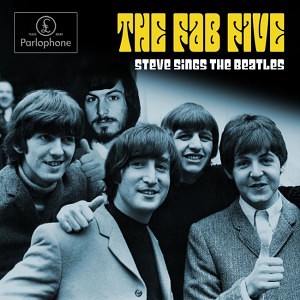
He wishes.
The difference was that Epstein didn’t live long enough for a second act. His life until age 32 suggests that there were other triumphs to follow; showbiz in the 70s and beyond would’ve surely been different had Epstein lived. Just as Jobs built Apple, ran it into a wall via his own hubris and youth and flaws, then came back to lead it higher, it’s not at all impossible that Brian would’ve done the same with The Beatles.
Brian Died For Our Sins
The second focus of my interest is the persistent portrayal of Brian as fundamentally tragic. I think this is skewed by hindsight and, to some degree, straight people’s attitudes towards male homosexuality in the period immediately after Gay Lib. Much is made of Brian’s deterioration after August 1966 for rhetorical reasons: because we know what’s going to happen, every popped pill or missed appointment (or Dizz Gillespie sighting) seems ominous. (“The Brian Epstein Story” makes it positively creepy.) Because Brian died accidentally, there’s a craving to make sense of it, and the easiest way to do that is to make it feel preordained.
Only now that we’ve had 50 years of the rock and roll lifestyle, we can say that Brian Epstein wasn’t particularly unstable, on the spectrum of drug users. Would I want him defusing atom bombs? No. But the Murray the K interview is notable precisely because it was one of the few times his sloppy personal life obviously got in the way of his professional responsibilities. Imagine if John Lennon had died of a heroin overdose in ’68-’69 — this interview would sound a lot more ominous, no?
But John Lennon could “handle his drugs,” right? Not necessarily. We don’t know how many close calls he had because, he, unlike Brian, survived. He was able to spin things after the fact, and probably did — John, hardly a paragon of willpower, supposedly tied himself to a chair to kick heroin (I don’t buy it). John, unlike Brian, was macho, straight, very masculine-acting, the leader of the band. That’s why people always get their knickers in a twist when it’s suggested that John might’ve been bi. The conventional narrative on Brian comes straight out of the “soft” stereotype of gay men. He’s passive (The Beatles are leaving me!), over-emotional (whatever shall I do?), weak (Nembutal, take me away!) — he’s female-seeming, and as Nancy has said, a lot of rock fans prefer a misogynist narrative. Mistreated by men, rendered incompetent by his emotionality, Brian succumbs to misadventure. This vision of Brian verges on “Valley of the Dolls” camp, and it can’t be the whole story, because a guy who did all the things Brian did between 1961-67 had to have a lot of emotional resilience and strength. But because it suggests that Brian Died For Our Sins, it appeals to a certain kind of sympathetic straight person (cf: Vivek Tiwary’s take on Brian Epstein and marriage).
All of this is not to say there isn’t some use in the standard narrative; it does explain some things. But just as we’re getting more nuanced versions of Lennon, McCartney and the rest, it’s time we do the same for Brian Epstein. And I don’t think that nuance will come from examining Brian’s contracts, because he wasn’t just a businessman; nor reducing him to his sex life, because he wasn’t just that, either. I think we have to start with what’s summed up in this quote from George’s first wife Patti: “[Brian] was not motivated by money but by a desire to make the dreams of his artists and pals come true. How rare and special that was…”
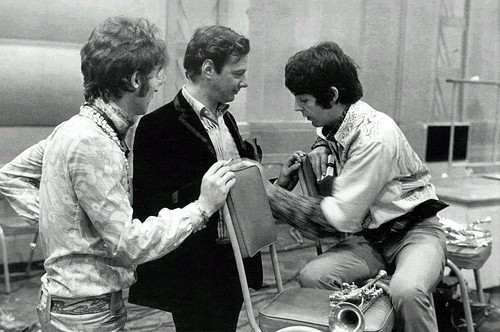
Brian visits the studio, June 1967.

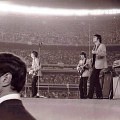

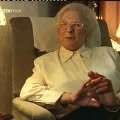
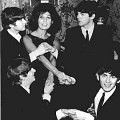
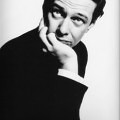
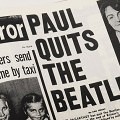

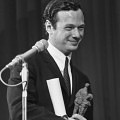
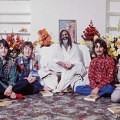
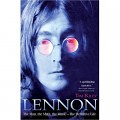
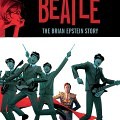

Thank you for this. Had Brian, in his business dealings, succumbed to being passive, over-emotional, and weak (or only one of those) even occasionally, NOBODY would have given him the time of day, especially with the added “baggage” of his Faggy Jewness.
Re. that Pattie quote: Brian Epstein and George Martin seem to have been the only ones among the group’s business associates (leaving aside old personal friends like Neil and Mal for argument’s sake) whose work was not motivated primarily by money. Interestingly, everything went to s*** once they’d removed themselves from the picture. So how come hardly anyone has taken a leaf or two out of their books?
You’re welcome, @Velvet. I think it takes a very rare personality type — to be a good helper, you have to have a lot of artistic talent (or at least taste) yourself, but have a desire to put someone else in the limelight. This is rare because lust for the limelight is generally what makes a person put in the time to develop talent/taste. And as celebrity culture has become more and more dominant, the dignity and finances of “helper” professions have really diminished. In the business I know, the quality of editor has decreased precipitously — and I’m talking about basic editing skills, not to mention knowledge of what has been done, nor what could be done. There’s just a dearth of top-notch brains, which has really injured the product. Which has driven away readers. Which makes the next generation less likely to go into that field, and money for good helpers even scarcer…It’s a huge problem. Most editors I know spend most of their time being not-very-good marketers. It’s as if George Martin couldn’t really work a mixing board, but had lots of opinions about “what the kids will be listening to next year.”
Well, it’s been said that George Martin really couldn’t work a mixing board very well, which is why he relied on Norman Smith and Geoff Emerick so much 🙂 (which may be an unsubstantiated rumour from the Emerick book, which I haven’t read. Should I?)
“A lot of artistic talent and the desire to put someone else in the spotlight”: Not what I imagine Allen Klein to have been like. (Could be wrong though – he did finance those Alejandro Jodorowsky movies! One of which George was supposed to star in, until he told the director that there was no way he was going to expose his nether regions in a film. Or something.)
Here’s the thing about Allen Klein, @Velvet — and I have met his ilk — he had a genuine talent, and performed a genuine service. If Epstein had lived, and hired Klein to go over EMI’s books (Epstein would’ve never done that, but go with me) The Beatles could’ve gotten all the benefits of having a Klein-like bulldog, without tempting Klein to overreach himself and enrich himself unfairly. What John Lennon didn’t understand is a common mistake artists made: having a bastard on your side means you have to deal with a bastard, and sooner or later he/she’s being a bastard to YOU.
My gut feeling on Klein is that he was a very smart man who had miles and miles of rationalizations; I’m sure *he* felt he was a straight-shooter. But his brand of rough-and-tumble seems to have always ended up hurting his clients, and that I don’t respect for someone who’s job title is “representative.”
Hm. I wonder what Klein’s “rationalization” was for doing everything in his power to widen the Paul-Rest of Group gap that had begun to manifest itself at least a few months before John hired him. That’s something that has never made sense to me – why effectively split the group when they could have been his source for oodles of money for years and years to come? Or had that been his plan all along – get it while you can, then facilitate petty squabbling among the band members so they (except possibly Paul) don’t notice how you’re ripping them off?
In the business I know, the quality of editor has decreased precipitously — and I’m talking about basic editing skills, not to mention knowledge of what has been done, nor what could be done. There’s just a dearth of top-notch brains, which has really injured the product.
.
I bought a new nonfiction book recently and was amazed at the typos I found.
.
I overheard this on This American Life: “if you were an assistant book editor in the 1950s, you would have been the person who discovered Catcher In The Rye and made it part of your portfolio. What does an assistant book editor do today? Change lightbulbs and order sandwiches.”
.
Brian does sound more lucid than one would expect after reading beatle biography accounts of this interview. I give him a lot of credit for showing up and making sense. Pharmaceuticals back then were brutal; it was a dangerous time to be taking physician-prescribed potions for sleep or anxiety. Nowadays, the SSRIs and benzos and ambien are brutal, but nothing like what was being prescribed in the 1940s-1960s. Especially with alcohol in the mix.
The typos are the least of it, @Sam. Copyediting’s mostly outsourced to freelancers, at pitiful rates.
The mediocrity of most print work isn’t a bug, it’s a feature. It’s dictated by a process that gives editors final say over what gets published and how — but editors at big corporate houses have very different definitions of success than authors do. (The readers, they don’t enter into it.) Good creative work isn’t that difficult, you just find talented people, stay out of their way, then market the finished product sensibly and sensitively; but the regimented and fear-driven process of corporate creativity reduces the “hit rate.” That’s why Brian was so necessary, and George Martin, and the rest.
I’m biased, because my one and only huge-ass hit was a book that I created totally on my own. In the UK, they re-packaged it well and released it in October, and it sold 750,000 copies; in the US, they flatly refused to help me improve my self-published packaging, and as revenge for my asking dumped it on the market in July (deadly), and it still sold 50,000. But that was a small number given that the US is 5x as big as the UK; and that Germany sold 125,000 copies (50K in hardback!), and France 35,000. But because my US publishers only predicted 50,000 in sales, they didn’t push it, even when it was #2 on the London Times bestseller list. That is not a defensible business decision — but editors are not businesspeople, and publishing is not run in a businesslike fashion, which is why the business has deteriorated and will continue to do so. (In the countries where publishers run in a more businesslike fashion, the deterioration has been less; which is why much of US publishing is owned by German conglomerates.) But in America, you have publishers making editorial decisions, editors making marketing decisions, and marketers making editorial decisions. It’s a total clusterf.
After that huge hit, book by book editors became more involved in the conception and packaging of my work, and my sales went down, down, down. Finally, after being commissioned to write and design a book and then stiffed on payment, I swore off working with them. Which is a shame because my stuff does have a huge audience, and could be much better with the right editor, someone who does for me what I’ve done for innumerable funny writers; and certainly if I were involved with someone familiar with the principles of successful humor marketing/packaging it would help, too. But under the current conditions it’s nearly impossible for me to get truly funny work out unmangled. It’s a quandary.
To bring this all back to The Beatles: there was a very complex machine operating to get songs from John and Paul’s heads into record stores worldwide, and the moment that very delicate chain was severed — when Brian died — everything else started to wither and die. Genius artists were a huge part of it, but they were only one part. (Witness the saga of SMiLE.)
BTW @Sam, strong agree regarding pharmaceuticals in the 50s and 60s. They were prescribed very irresponsibly in a time when little was known about addiction, and it was very easy to get into the kind of trap Brian found himself in — needing one type to sleep and another type to stay awake. Sort of a chemical manic-depression.
This is to some degree why my view of Brian is sunnier than others; I think he was a basically functional guy with a problematic sex life, and an addiction he may not have been 100% responsible for. Get him off the pills and have him live somewhere where gay sex was legal (or tolerated), and he may well have been a solid citizen for fifty years.
pharmaceuticals in the 50s and 60s… were prescribed very irresponsibly in a time when little was known about addiction, and it was very easy to get into the kind of trap Brian found himself in — needing one type to sleep and another type to stay awake. Sort of a chemical manic-depression.
“The Road To Miltown” came out in 1957. Perelman and Thurber said it was the age of anxiety. The pills spread from psychiatric patients to the “worried well” and on to popular culture. Years earlier, the frail young daughter of Don Marquis was inadvertently killed by a nurse who administered an injection to “calm her down” during a coughing fit.
(In addition to alcohol) Benchley took benzedrine every day, and a powerful sleeping pill every night. Also, MGM doctors gave him “vitamin” shots for extra pep. In 1945, feeling sluggish, he visited one of the studio docs (his regular doctor was pissed when he found out!) for a vitamin shot which caused the nosebleeds that led to his death. And what was done to help Brian Epstein? A sleep cure, a medically-induced coma, which solved nothing.
Oh, you’re going to write that Benchley bio, @Hologram, if I have to come up to where you live and stand over you as you type. Do it! What you just wrote — that little fact — is important! (And I couldn’t find it in Laughter’s Gentle Soul.) It’s easy to say, “Oh Benchley died because he was a drunk,” just like it’s easy to say that Brian died because he was a tormented gay icon. But is it correct? It’s disrespectful to the struggle and the beauty and the complexity of existence. We simplify to hide people’s flaws, but what we really hide is their heroism in the face of insurmountable odds; none of us get out of here alive.
If we want to curb these kinds of inadvertent addictions — and for God’s sake why wouldn’t we want to? — we have to start talking about how they happen.
In the June 1967 photo, Brian looks like he was poised to become the New No. 2 on “The Prisoner”. There was already a significant amount of Beatles/Prisoner overlap, what with Leo McKern and Patrick Cargill serving as Numbers 2, The Beatles allowing use of their song “All You Need Is Love” in an episode, even George’s son’s band is called The New Number Two! If he had lived, Brian would have been a natural…I can hear him bantering with irritable old Paddy Mac right now:
McGoohan: Where am I?
Brian: In the village.
McGoohan: What do you want?
Brian: Information.
McGoohan: Whose side are you on?
Brian: That would be telling…. We want information…information…information!
McGoohan: You won’t get it!
Brian: By hook or by crook, we will.
McGoohan: Who are you?
Brian: The new Number Two.
McGoohan: Who is Number One?
Brian: You are Number Six.
McGoohan: I am not a number; I am a free man!
Brian: [Laughter]
Did Magical Mystery Tour get started in April? HMMM.
http://drtomoculus.blogspot.co.uk/2012/12/16th-january-1967.html
[…] What If Brian Epstein Lived? — MG’s admittedly rosy reading of an alternate future 1967 Brian Epstein Interview with Murray the K — an interesting glimpse into Brian’s mindset during the last months of his life The […]
Thank you! Murray talks about a book he wrote about the Beatles. I can’t find it … Or is it: “Murray tells it like it is, baby”?